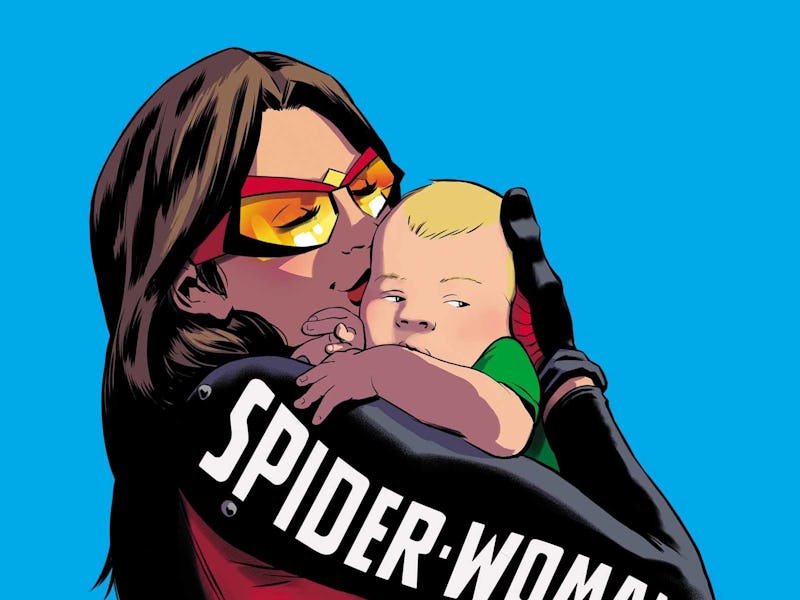'Guardians 2''s Ayesha Joins A History of Female Breeders in Comics
When everyone wants to fight evil, but no one wants to be a mom.

Parenthood isn’t a major theme in superhero comics. Sure, morning sickness and changing diapers is not as glamorous as fighting evil and traveling the universe, but given the enormous depth and complexity of comic universes, its absence is rather glaring.
Sure, superheroes get down, but they must all be using condoms, because they’re almost universally free of the super unwanted pregnancy. Plenty of superheroes turn out to be the secret child of other male superheroes, but these children don’t appear until they are conveniently teens or adults. Even though The Incredibles manages to make babies super, you’re still unlikely to see one in a comic book.
Super babies can be entertaining too.
Plenty of superheroes have stable relationships and even children in alternate timeline stories, but then again, they also have clones, or die, or any other number of variations that represent a “not right” version of their story. Even Wonder Woman ends up popping out a few with Superman in a couple of these alternate timelines, including this hilarious frame of Superman as an L.L. Bean dad and Bruce Wayne as Bionic Uncle Bruce.
Honey, get off the ceiling!
In a way, with the cultural obsession with motherhood, and the pervasive assumption that all women will have children, it’s refreshing to see female characters unburdened by the pressure to reproduce. No one wants to see Wonder Woman suffer through the third baby shower this month, or dodge questions about when she’s going to be next. But the treatment of the rare character that does go through pregnancy and childbirth shows us that more often than not, the omission of children is for mere storytelling convenience.
Jessica Jones, of all people, has a daughter with Luke Cage. Technically, she gives birth during a period when she’s given up her superhero duties, but after her daughter’s birth, the child serves to perpetuate and underscore the same struggles Jones has gone through before: she is torn between the superhero world and trying to lead a normal life, unable to fit in to either group.
Some characters’ stories address their inability to have children. Poison Ivy is a villain and unable to have children of her own, but she’s still quite maternal, adopting orphans and protecting them in her Robinson Park paradise. Scarlet Witch goes through great lengths to bring herself children, using magical energy to create her twins, who were soon lost.
Poison Ivy and the Robinson Park orphans.
Mystique, surprisingly, had two sons, and was unsurprisingly a pretty bad mom. Her son with fellow mutant Sabretooth was given up for adoption when he turned out to be a regular human, she she was forced to abandon her other son, the half-demon Nightcrawler. Both her sons were conceived via seduction and deceit, and thus their births are just a part of Mystiques villainy. Despite giving up two inconvenient children, Mystique did adopt Rogue; they had a tumultuous relationship, and eventually Rogue turned on her.
We talked before about Ayesha, the upcoming villain of Guardians of the Galaxy Vol. 2, who is driven by her desire to procreate. Being of a superhuman race, however, she does not actually bear her own children. She appeared primarily in Marvel’s Quasar series, where she mates with various superheroes by attaching her cocoons to their bodies. She finally sets her sights on Quasar, the superhero so pro-life he’s doesn’t attempt to destroy her cocoon. The best thing to come out of the series was this cover.
"Having Her Baby!"
DC’s Maxima was originally quite similar to Ayesha, sent from her home planet to mate and repopulate her race. She consistently pursues Superman as her mate. For her, reproducing is a duty she pursues out of obligation. She was occasionally implied to be bisexual or lesbian, and recently rebooted as a canonically gay character, which is a much better story than the (alt future) time she made out with Superman on Lois Lane’s grave.
Stone cold.
In both instances, these female characters who are driven to procreate are couched in the same language of mating and breeding. They are not motivated by maternal desire but rather necessity, and thus will not actually bear any maternal responsibility for carrying or raising their offspring. They feed more into scary sexy alien narratives than motherhood narratives.
Alternately, Marvel’s Spiderwoman has been fighting her urge to fight crime while egregiously pregnant. Part of the fun in that comic is that she’s purposefully hiding the father’s identity from other superheroes. And, of course, outside the major comic book universes, parenthood can make for amazing storytelling. Look no further than the Saga series for a story about parenthood, from pregnancy on, that still manages to be funny, sexy, thrilling and adventurous.